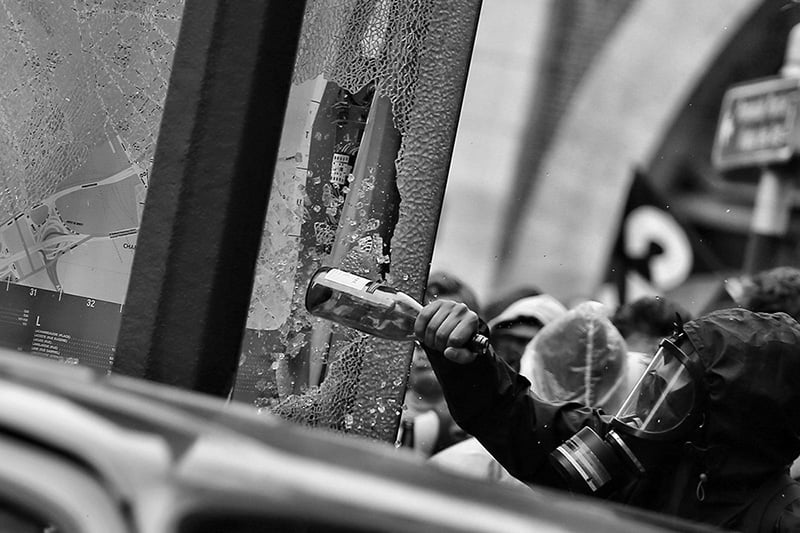U.S. Current Trend: Collective Liability
The Rise of Collective Liability at Protests
In the United States, collective liability is increasingly applied in the context of demonstrations. This trend can lead to results that are unjust to protesters or organizations charged on such grounds. It also threatens to curtail the right to assembly by discouraging individuals and groups from joining or helping organize demonstrations because they fear they could be held liable for others actions.

THE J20 PROTESTS
In the aftermath of the Disrupt J20 protest during the inauguration of President Donald Trump in January 2017, the U.S. Attorney’s Office pursued a highly aggressive prosecution strategy. During the demonstration, several protesters engaged in vandalism and assaulted a limousine driver. In response, law enforcement officers corralled and trapped more than 200 protesters in a tactic known as “kettling.”They were subsequently arrested, and the U.S. Attorney’s Office brought multiple felony and misdemeanor charges involving incitement to riot and destruction of property against more than 160 protesters. The charges entailed up to sixty years in jail for each of the accused. Significantly, the prosecutors did not claim that they had evidence that the defendants had damaged property or inflicted injuries on others. Rather, they accused them of having taken part in a demonstration that they should have known would lead to illegal behavior.
The trial of the first group of protesters began in November 2017, some ten months after they were charged. In December 2017, a jury found the first six defendants not guilty of all charges. In January 2018, charges were dropped against more than 100 other defendants. By July 2018, charges had been dropped against all remaining defendants. None of the Disrupt J20 protesters was convicted, although twenty-one defendants pleaded guilty to at least some charge.
Protestors that went through trial proceedings or faced the possibility of trial experienced significant financial, professional, and emotional costs. As one protester explained, she went to the protest “to make a political point, as [I had] at many other protests.” Minutes after arriving at the protest, she was arrested, charged with multiple felonies and misdemeanors, and ended up with a life transformed as she awaited trial for more than a year.
STATE LEGISLATION
Not only federal prosecutors have applied collective liability in the context of demonstrations. Several states have passed or are considering legislation that would make it even easier to hold protesters and organizers of protests liable for the actions of others. For example, after the Dakota Access Pipeline demonstrations in North Dakota, in May 2017 Oklahoma’s governor signed a law that increases penalties for protesters who trespass on or damage critical infrastructure, defined broadly as anything from a power plant to a telephone pole. Under the new act, an organization that is found to be a “conspirator” in any crime listed in the legislation can face a fine of up to $1 million. Rights advocates have raised concerns that these sanctions will stop groups and individuals from organizing protests because they fear they could be held liable for any trespassing or property destruction that occurs during the demonstrations.
In December 2017, the American Legislative Exchange Council (ALEC), a free-market advocacy organization, released a model bill based on the Oklahoma critical infrastructure legislation. In the 2019 legislative session, several states introduced critical infrastructure bills with collective liability provisions, often drawing on ALEC language, and Indiana and North Dakota enacted such bills. In South Dakota, the state controversially enacted a “riot boosters” bill that would among other things create liability for a person or individual who does not participate in a riot themselves, but “advises, encourages, or solicits” those that do. The Governor of South Dakota stated that the law would allow the state to explicitly go after funders of disruptive protests. The South Dakota law is being challenged as unconstitutional in the courts.
The application of collective liability in the context of protests is a troubling development. Such prosecutions can discourage participation in demonstrations if potential participants fear that they could face severe sanctions simply by taking part. As the Inter-American Commission noted in December 2017, these and other restrictive measures in the United States set a negative international precedent. The United States has long viewed itself as the beacon of free expression, but these developments provide cover for governments elsewhere to use tactics such as collective liability to suppress demonstrations.
CRITICAL INFRASTRUCTURE BILLS
For an analysis of collective liability provisions in critical infrastructure bills, see ICNL’s legislative briefer “Guilt by Association”: Critical Infrastructure Bills and the Right to Protest.
Last updated: July 2018
For more information contact: Nick Robinson at nrobinson@icnl.org
To subscribe to US Program email updates, click here.
Sign up for our newsletters
Sign up